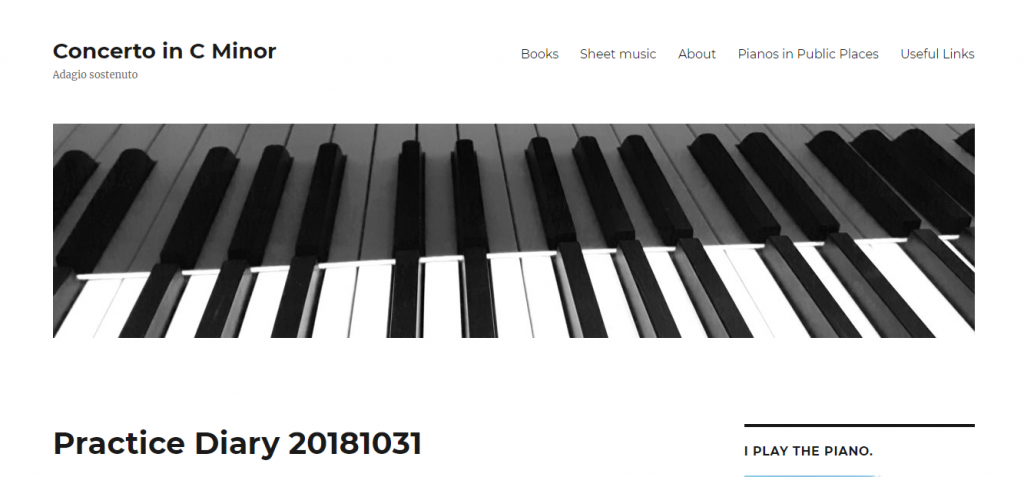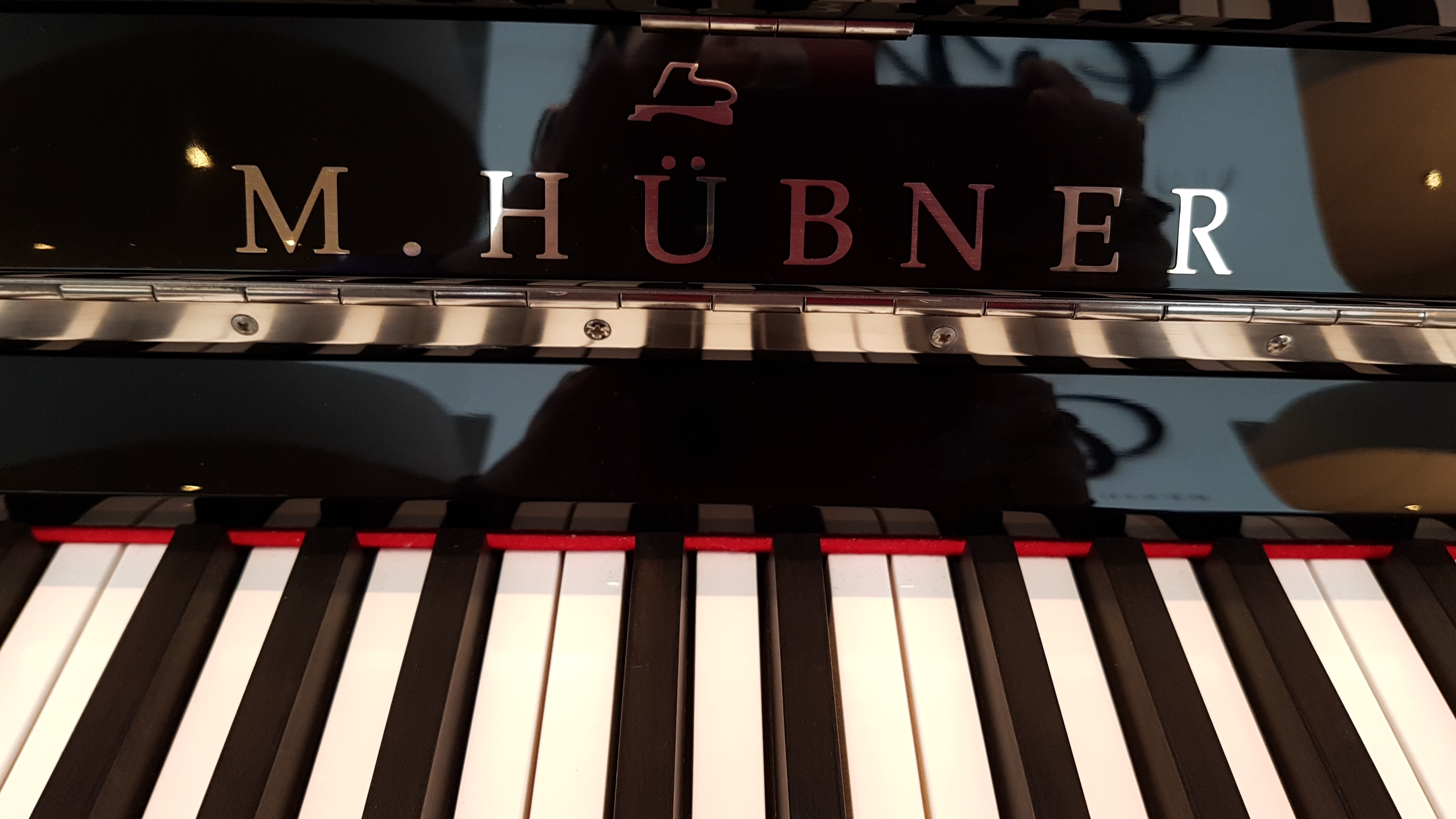The last time I bought a guitar, prior to yesterday anyway, was sometime in 1991. I bought an Applause with a wooden neck in a shop in Fussen in the south of Germany. I traded in an Applause with a metal neck against it. In truth, the main problem with the metal neck was that I was at the limit with what I could do with very high action in terms of fixing it and I struggled to play it. I wasn’t looking to change but there was this lovely looking and sounding guitar that looked just like mine, except it had a wooden neck. I named it Andy, after I took delivery of it, and that was it. I liked the guy who owned that music shop. He let me play his pianos, and he spoke to the guy who owned the bar across the way and said things like “she can play the piano, and you should let her”. The day he did, my friends spent a lot of money on beer and someone called Craig spent hours asking me to play something called Misty. I have no idea but this is probably a lack on my film culture part
The Applause went everywhere with me. Ireland. France. Germany. Finland, Belgium, UK. It opened doors, and got me friends and acquaintances. But sometime while I was living in Dublin I seemed to stop playing very often. I think social media had something to do with it; I also think part of it was the pressure on IT people to be constantly adding to their skillsets in their free time, and then of course, there was the photography which swallowed every spare minute I had for about 5 years. When I came to Luxembourg, Andy did not come with me.
I’ve had mixed feelings about this. I got a piano sharpish after I arrived in here because Kleber rented digital pianos which is handy when you are in an apartment block but the guitar thing was , well you don’t play often and you have a guitar. At some point I went and looked at some Taylors. I fell in love with a Taylor when I moved to Dublin in 1999 but I did not have the money for it so was saving. When I had the money, none of the Taylors felt right so I left the decision, pretty much forever When I went back last year to look at them as it seemed easier to buy a midrange guitar (ie far less than three thousand euro but a bit more than 85E with a sparkly box and a Santa Claus) than to shop a guitar across a bunch of flights and surface travel, I looked at Taylors and yet….nothing.
This is the thing about musical instruments, particularly stringed ones. You need to feel them. I cannot describe to you what I want from a guitar only that I have to play it and either it feels right or it doesn’t. None of the Taylors felt right. I think I played a Seagull the same day and possibly an accoustic Fender. Nothing.
I had this conversation during the week at work with someone. I don’t know if he plays music or not because he has not told me. He did tell me there was a good music shop not so far away which I had not been to and that maybe it might be worth a trek out on the bus. It wouldn’t be hard, and on that, he was really right. It took about 15 minutes from work and I went and had a look. There were a bunch of Martins, a couple of Yamahas and a few others, and a wall of acoustic Ibanezes
I kind of went off Yamahas at some point. When I was 15 they were THE guitar to play. I wonder how much of this is driven by what’s available locally and how it is priced. Anyway, the Yamahas today tend to fit into the Christmas present for starters bracket and I wanted something a little more than that. I started playing more than 30 years ago and could do some quite nice things with a guitar, like, sing. So I had a look at the Martins. One of my friends in Dublin had a Dreadnought which he had, if I remember rightly, bought second hand, and which was the absolute love of his life. Before his wife and children.
But none of these really appealed to me. I mean, a guitar is a guitar is a guitar is a guitar but meh. 1000-3000E worth of Martin wasn’t hitting the spot. So I went and looked at the Ibanezes. I wasn’t sure what to expect – I know they have good reps as electrics, and most of the names I hear endorsing or playing Ibs are electric. But there were three rather lovely looking guitars hanging on the wall and two of them caught my eye. They were both priced at somewhere between Christmas Present for Teenager and Been saving up for 5 years adult guitar nerd, which is to say they were the same. One was a cut away and rather unusually, it looked to have a slightly narrower neck. I asked if I could play that one and they said yes.
Yesterday, in many respects, was not a good day to test guitars. My nails were long, and protected by four layers of nail polish, and of course, having not played much for a few years, my fingers were going to hurt. They did. They do, even though I cleaned off the nail polish and cut the nails to what I thought was short enough (clue; it isn’t). But the guitar resonated remarkably for what was quite a small body – in fact, it’s an AE205Jr which means in practice, a slightly shorter fretboard and a smaller body. 10 years ago, I’d probably have turned my nose up at it and I would have been wrong to do so. It feels remarkably perfect in my hands; it has a gorgeous sound and it resonates with my heart. I’m obviously very rusty in terms of playing but the speed which which things are coming back has astonished me. There is a little getting used to the shorter frets and the slightly narrower neck but not much. I have small fingers as I know to my cost from the piano.
There was a time I knew every single guitar shop in Dublin, and every single acoustic guitar on sale in Dublin. I spent hours of my life playing them. I was heartbroken to hear Waltons on South Great Georges Street was closing – I used to go in there to play at my lunch hour when I was working in the area. In a way, it’s surprising I haven’t really don’t the same here although I imagine part of it can be explained by having a piano at home now. But I have played a lot of guitars in my life in shops in Dublin, London, Germany and wherever. In truth, I have never played a guitar quite like this. It really packs a punch way above what I would have expected for its size and especially, what I paid for it. Every review of the guitar which I have seen since has been immensely positive, both in terms of the sound, and its value for money. Despite the JR label on it, anyone I’ve seen playing it has actually really liked it. I found that edifying, and validating.
Mostly, the plan for me is to start playing trad again after a 10 year break away and while my list of desired features was “made noise, sweetly” and “doesn’t bankrupt me”, it didn’t occur to me that I would also wind up with a really light weight guitar that was easy to carry around. So that’s a useful bonus.
It’s funny though; old feelings never go away. I bought a couple of plectrums to tide me over until I get back to Ireland to pick up my box of tricks (I have hundreds) and the smallest that I found was a .46mm Dunlop, a plec I know well as I probably have about five in various boxes at home in Ireland, and yet it still felt really hard. It’s just occurred to me that in fact, I mostly used to play with a 0.38. Almost like paper.
Like my previous guitars, it has been named, and unusually, it hasn’t got a male name, but a letter, F. Mostly, when I went to tune it yesterday it was a couple of tones below concert such that the A was nearer F. So….
I can’t really compare it to my other guitar (and it feels wrong to talk about “other” guitars) as they are very different, and, more specifically, separated by an ocean, an island and a lot of land. So I don’t know how I’d feel about having the two of them in the same place. But then they were bought at different times in my life and I’ve done different things with them and I expect that playing them even now would feel different.
 I set up a new blog during the week – it isn’t like I have the time to maintain a load of content across several sites – but I also see the risk of flooding this site with a lot of things I wanted to write about which are more for my own self indulgence more than anything. Pianos in other words.
I set up a new blog during the week – it isn’t like I have the time to maintain a load of content across several sites – but I also see the risk of flooding this site with a lot of things I wanted to write about which are more for my own self indulgence more than anything. Pianos in other words.